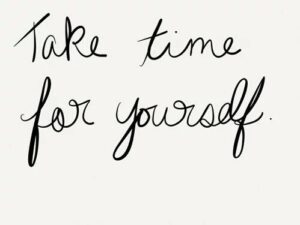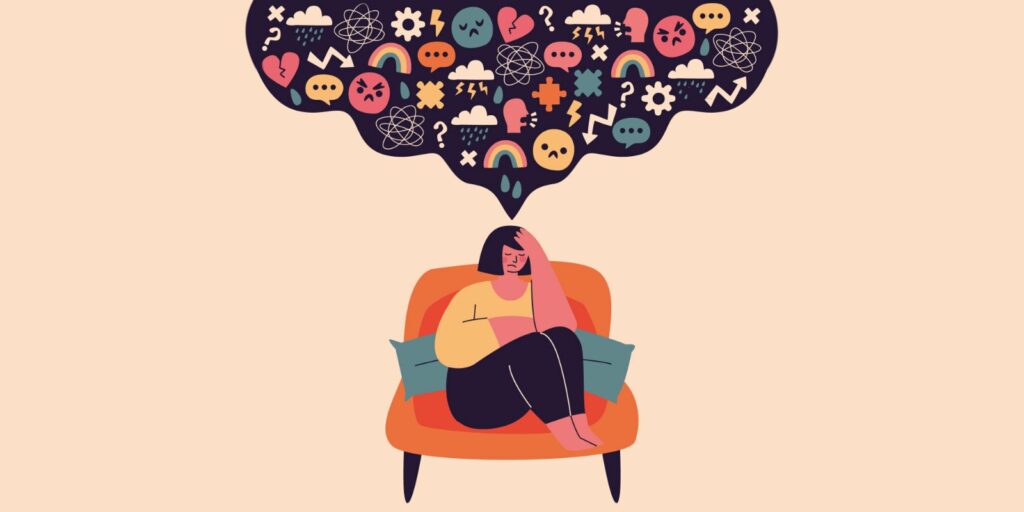Anxiety is a feeling of unease, worry, or fear. It can be mild or severe, and it can interfere with our daily lives. Many people experience anxiousness at some point in their lives, but for some people, it becomes a debilitating condition. If you are struggling with anxiousness, don’t despair! There are many ways that you can deal with it and get relief from the symptoms. In this blog post, we will discuss what anxiety is, the symptoms of anxiousness, and how to deal with it.
Contents
What Is Anxiousness?
 Anxiousness is a feeling of uneasiness, worry, or fear. Everyone feels anxious at some point in their lives. However, for some people, anxiety can be a chronic (long-lasting) condition that interferes with their daily lives. In simple words, anxiousness is just fear without a known cause.
Anxiousness is a feeling of uneasiness, worry, or fear. Everyone feels anxious at some point in their lives. However, for some people, anxiety can be a chronic (long-lasting) condition that interferes with their daily lives. In simple words, anxiousness is just fear without a known cause.
There are different types of anxiety disorders, each with its own set of symptoms. Some people experience only one type of anxiety disorder, while others may experience multiple types. The most common types of anxiety disorders include:
- Generalized Anxiety Disorder (GAD)
- Panic Disorder
- Social Anxiety Disorder (SAD)
- Obsessive-Compulsive Disorder (OCD)
- Post-Traumatic Stress Disorder (PTSD)
Anxiety can manifest itself in different ways. It is important to remember that everyone experiences anxiety differently. It is believed that anxiousness is very common, affecting as many as one in every four people.
If you are experiencing anxiety, there are several things that you can do to help yourself feel better. You should know that you are not alone and that there is help available. The most important thing to do is to seek professional help if you feel that your anxiety is affecting your daily life.
How To Identify It?
There are a few key signs and symptoms to look out for if you think you might be suffering from anxiousness. Some common symptoms of anxiety include:
- Irritability
- Restlessness
- Fatigue
- Difficulty concentrating
- Muscle tension
- Sleep problems (difficulty falling or staying asleep, or restless, unsatisfying sleep)
- Sweating
- Racing heart
- Butterflies in stomach
- Dry mouth
It is important to note that everyone experiences anxiety differently and not everyone will experience all of the above symptoms. Some people may only experience a few, while others may experience many more. For instance, if you have a social anxiety disorder, you may only experience symptoms when you are in social situations. If you have a generalized anxiety disorder (GAD), you may feel anxious all the time, even when there is nothing specific triggering your anxiety.
Therefore, it is important to pay attention to your body and how you feel day-to-day. If you notice that you are regularly feeling anxious and it is impacting your ability to function in daily life, it is important to talk to a doctor or mental health professional. They will be able to help you determine if what you are experiencing is anxiety or something else.
Is Anxiousness A Mental Disorder Or An Emotion?
Anxiousness is often seen as a mental disorder, but it is actually an emotion. It is the feeling of worry, fear, or unease. Everyone experiences anxiousness at some point in their lives. For some people, though, anxiousness can be so severe that it interferes with their daily lives.
Also, many people consider anxiousness a mental disorder because it is often accompanied by physical symptoms, such as a racing heart, sweating, and trembling. These physical symptoms can make it hard to concentrate or even carry out simple tasks.
Anxiousness disorders are the most common mental disorders in the United States. They affect 40 million adults or 18% of the population. But the emotion of anxiousness itself is not a mental disorder. You have to experience it in response to a real or perceived threat to your well-being. That’s what makes it an emotion.
Anxiousness is a normal emotion that everyone experiences at one time or another. It becomes a problem when it is so severe that it interferes with your daily life or causes you distress. However, not everyone who experiences anxiousness will develop an anxiety disorder. Most people who experience anxiousness do not go on to develop a disorder.
If you are experiencing severe anxiety, it is important to seek help from a mental health professional. They can help you understand your symptoms and develop a treatment plan to improve your quality of life.
What Triggers Anxiousness?
 Many people experience anxiousness at some point in their lives. It can be triggered by a variety of factors, these include:
Many people experience anxiousness at some point in their lives. It can be triggered by a variety of factors, these include:
- Work stress: It is not uncommon for work to be a source of stress. This can be due to a high workload, tight deadlines, or difficult co-workers.
- Money worries: Money is one of the most common sources of stress. This can be due to debt, unexpected expenses, or difficulty making ends meet.
- Health concerns: Illness, injuries, and medical conditions can all trigger anxiety. This can be due to the fear of the unknown, or the worry of how it will affect your life.
- Relationship troubles: Relationship difficulties can be a source of stress and anxiety. This can be due to arguments, communication problems, or feeling disconnected from your partner.
These are some common triggers, but in addition, there could be some risk factors that make you more susceptible to anxiousness. These include:
- Genetics: If you have a family member who suffers from anxiety, you may be more likely to experience it yourself.
- Brain chemistry: An imbalance of certain chemicals in the brain can lead to anxiety.
- Personality: People who are perfectionists or have a lot of self-doubts may be more likely to experience anxiety.
- Life events: Traumatic or stressful life events, such as divorce or the death of a loved one, can trigger anxiety.
So overall these are some things that might trigger anxiousness and some risk factors to be aware of. Because this condition is so individual, it is important to speak with a doctor or mental health professional to get personalized help. They can assist you in understanding your triggers and developing a plan to manage your anxiety.
How Can I Stop Feeling Anxious?
It is normal to feel anxious at times. Anxiety becomes a problem when it interferes with our daily lives. If you are experiencing anxiety that is affecting your life, there are things that you can do to stop feeling anxious. Some of these tips are listed below:
Identify your triggers
What makes you feel anxious? Once you know what your triggers are, you can begin to avoid them or manage them better. This is one of the most important steps in managing your anxiety. Because when you know what your triggers are, you can take steps to avoid them. For instance, you might avoid watching the news before bed because it makes you anxious about the world.
Talk to someone
It is important to talk to someone about what you’re going through. This can be a friend, family member, therapist, or anyone else who will listen and support you. Talking about your anxiety can help to lessen its effects. It can also help you to understand your anxiety better and find ways to cope with it. For instance, if you’re feeling overwhelmed by your anxiety, talking to a therapist can help you to get the support that you need.
Regular exercise
Exercise is a great way to reduce anxiety. It helps to release endorphins, which have mood-boosting effects. Exercise also helps to reduce stress hormones, such as cortisol. And it can provide a distraction from the thoughts and worries that are causing you anxiety. For instance, going for a run can help to take your mind off of your anxiety and give you some time to clear your head.
Get enough sleep
Sleep is important for overall health and well-being. It can also help to reduce anxiety. When you’re sleep-deprived, your body and mind are under stress, which can make anxiety worse. People should aim to get seven to eight hours of sleep each night. Because when you’re anxious, your body is in a state of high alert and you’re more likely to experience insomnia, try to establish a regular sleep schedule.
Relaxation techniques
 It is important to learn how to relax when you are feeling anxious. Relaxation techniques can help you control your anxiety and may prevent you from becoming more anxious in the future. Relaxation techniques include:
It is important to learn how to relax when you are feeling anxious. Relaxation techniques can help you control your anxiety and may prevent you from becoming more anxious in the future. Relaxation techniques include:
- Deep breathing
- Progressive muscle relaxation
- Visualization
- Yoga
- Tai chi
If you are feeling anxious, try one of these relaxation techniques to help you feel more relaxed.
Challenge your thoughts
This is a key part of managing anxiety. When you’re feeling anxious, your brain is likely to be working overtime, coming up with all sorts of scenarios that might happen. These thoughts can be negative and overwhelming, and they can make you feel even more anxious.
One way to challenge your anxiety is to question the thoughts that are making you anxious. Are they really likely to happen? What is the evidence for and against them? Would they be as bad as you think? Eventually, you will be able to see that your anxiety is exaggerated and that will help you feel calmer.
Keep a journal
Journaling is always a great way to get out your feelings and thoughts. It can be therapeutic to just write and not worry about anyone reading it. Write about what is making you anxious and see if you can find any patterns. Once you know what is triggering your anxiety, you can start to work on avoiding those situations.
Writing your feelings can also help you to see them from a different perspective. Sometimes when we are anxious, we are only thinking about the worst-case scenario. But when you write it down, you can see that your thoughts might be exaggerated and not based on reality. This can help you to start to challenge your anxiety and learn how to better deal with it.
Take some time for yourself
 It is important to take some time out for yourself when you are feeling anxious. This can be anything from reading a book, going for a walk, or taking a bath. Taking some time to relax will help you clear your mind and allow you to think more clearly. When you take out some time for yourself, you are also able to better deal with the situation that is causing you anxiety.
It is important to take some time out for yourself when you are feeling anxious. This can be anything from reading a book, going for a walk, or taking a bath. Taking some time to relax will help you clear your mind and allow you to think more clearly. When you take out some time for yourself, you are also able to better deal with the situation that is causing you anxiety.
So, these are some tips that can help you deal with anxiety. Remember, it is important to seek professional help if your anxiety is severe or if it is impacting your day-to-day life. Anxiety can be a difficult thing to deal with, but you are not alone. Many people suffer from anxiety and there are many resources available to help you cope.
With the right help, you can learn to manage your anxiety and live a happy and fulfilling life. Seek help if you need it. Don’t suffer in silence.
Conclusion
To conclude, anxiousness is simply fear or worry that is exaggerated in your mind. It is important to remember that everyone experiences anxiety at some point in their lives, and it is nothing to be ashamed of. If you are struggling with anxiety, there are many resources available to help you cope.
You just need to be willing to ask for help and open up about your anxieties. Only then can you begin to work on overcoming them. Do not hesitate to reach out for help when anxiety feels overwhelming.
For more tips and guidance, you can reach out to Therapy Mantra. The team of professional counselors is more than happy to help you in your journey to recovery. Contact us today to learn more about our services. You can also book an online therapy session or download our free Android or iOS app.


